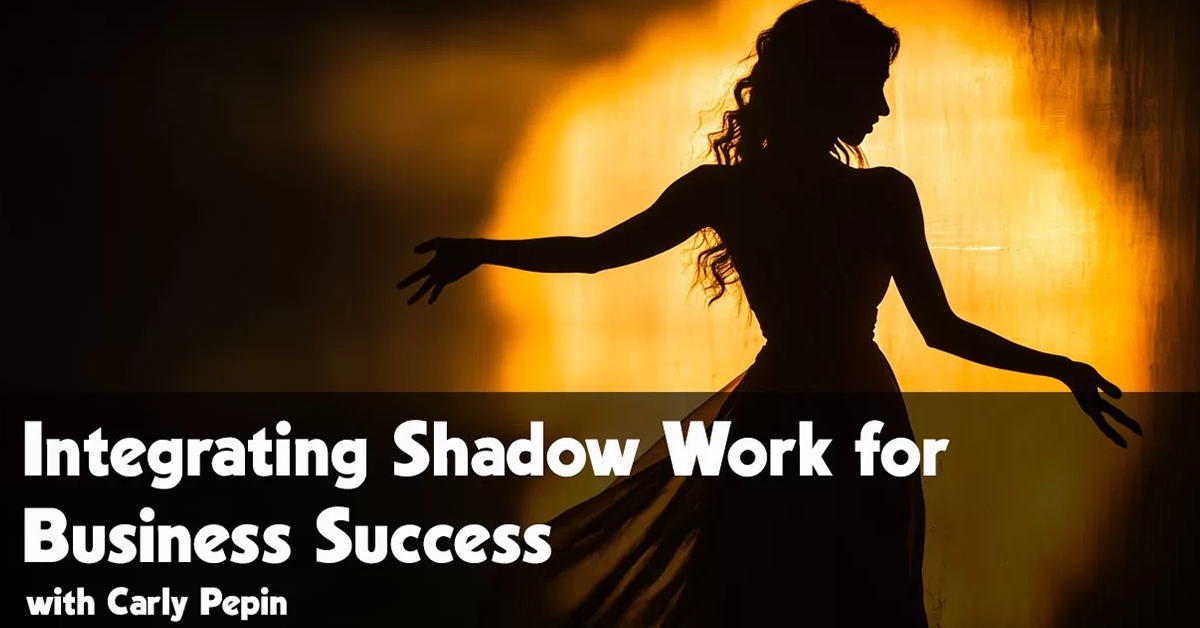
Carly Pepin is a human behavior specialist and business consultant dedicated to helping business leaders and entrepreneurs create transformative change from the inside out. Carly’s work focuses on integrating the often-overlooked parts of ourselves to break through challenges and reach new heights in both personal and professional life. With a unique blend of insight into human psychology and a deep understanding of the inner obstacles people face, Carly offers a fresh perspective on navigating the complex world of leadership and personal growth.
Carly shares practical tools and thought-provoking concepts around topics like overcoming self-imposed limits, understanding the drivers behind our behavior, and discovering how our inner dynamics directly influence our success. If you’ve ever felt stuck despite doing “all the right things” in business, Carly’s approach offers a new path forward, challenging listeners to tap into a deeper sense of meaning and purpose that fuels both business growth and personal satisfaction.
One of the unique ideas Carly brings to the episode is the importance of embracing all aspects of ourselves—what we often label as “shadow” parts. She highlights that by removing judgment and integrating these sides, we unlock authentic power and show up fully as leaders. Her message inspires us to rethink our own motivations and to move beyond the conventional success metrics, creating a life and business aligned with what truly matters. Whether you’re a business owner, a leader, or simply curious about self-growth, this episode offers invaluable wisdom on transforming inner alignment into real-world impact.
*Get the full show notes and details on the podcast website: https://xfactorhypnosis.com/integrating-shadow-work-for-business-success
*You can also connect directly with me via: joshua@xfactorhypnosis.com
*Please rate and review the show so we know what you like for the future.
Watch the episode here
Listen to the episode here
Welcome to Super States. Today I have a special guest with me, Carly Pepin. Carly, welcome to the show.
Thank you so much for having me.
I’m excited to jump in with this, Carly. Describe what you do and the kind of impact it has on people’s lives.
The Role of a Human Behavior Specialist
Yeah, so I’m a human behavior specialist and business consultant. When I work with business people, I like to approach it from the inside out. There’s so much we can do externally, taking all the actions we’re supposed to, but many of us find that things still don’t work out. And it leaves us wondering, “What’s really going on here?” So I also focus on the inner dynamic—understanding where our challenges lie, what we might be avoiding, or even what fears are at play. When we address those, we find new levels of inspiration and drive in business.
Business is such a great tool for creating impact. I love working with business owners who care about people—not just their customers or clients but also their employees, their teammates. It’s inspiring to help them navigate their inner challenges so they can reach people in a bigger, more impactful way.
What Exactly Is a Human Behavior Expert?
When I was looking at your website, I was really curious about the term “human behavior expert.” What exactly does that mean?
When we think about human behavior, we often go through books and resources trying to train ourselves to be a certain way. But human behavior is dynamic; we display both “light” and “shadow” sides. And no matter how much you try, you can’t get rid of a part of yourself. You can try as much as you want, but if I sit with you for a few minutes and ask a few questions, you’ll see that those parts are still there. They serve a purpose.
When I focus on human behavior, I focus on why behaviors come forward in the first place. Some behaviors might challenge our lives, so we work on understanding why they’re there. Instead of getting rid of them, we transform them. For example, I might work with a group in a workshop setting where my goal is to get everyone to a place of transformation. That might mean being “thorough and nice,” but also a bit intense. It’s not about being one way or the other—it’s about using all parts of ourselves to keep moving forward.
The Value of Both Sides
I really like that frame of “using all parts of ourselves.” It sounds a lot like shadow work—integrating all these aspects to create something whole.
Exactly. Shadow work is a great way to think of it. But even “shadow” is just a label. We often think of our shadow side as dark, but what if I told you your shadow side is actually part of your light? I want people to appreciate all of themselves and realize that what we label as “shadow” or “light” is really just different facets of who we are. Both sides interchange regularly, and we label them based on someone else’s experience of us.
Let’s say I help someone with something, and they praise me. I might label that as “light.” But if I support someone and they get upset with me for stepping in, I might see that side as “dark.” But the truth? It’s both. Sometimes people need support; other times, they need to be challenged. And it’s those challenging moments that can actually be the most transformative.

Reframing Stories and Labels
Yeah, I resonate with that. You’re calling it “the label.” I might say “the story” we put around it—it’s the same thing. We’re making up meaning and applying it to different parts of ourselves or our experiences.
Yes! Story is another great way to explain it. We often categorize experiences as “good” or “bad,” but the “bad” experiences often pull out parts of us we hadn’t explored, parts that can inspire us in new ways. Those challenging moments are sometimes the most innovative. We might initially think, “I don’t want to go through that again,” but later, we realize how it shaped us.
And when everything’s going smoothly, we don’t feel the need to be as creative. We don’t innovate as much. But when things get challenging, we have to dig deeper. I tell my clients that our goal isn’t to eliminate challenges but to choose challenges that inspire us. When we do that, we’re not just avoiding discomfort—we’re growing from it.
Moving from Self-Judgment to Self-Appreciation
That makes sense. So, for someone who’s going through that process, what does the journey look like when they start working with you?
When clients first come to me, a lot of them are dealing with some form of self-judgment or a sense that their life isn’t where it “should” be. My first step is to ask questions like, “Who are you comparing yourself to?” or “What did you think your life should look like?” These questions help uncover their true purpose. When they see the value in their current life, that sense of needing to change disappears. They start embracing where they are, which is so powerful.
It sounds like you’re guiding them to a place where life feels more like something they “get to” do, rather than “have to” do.
Exactly. We often wake up thinking, “I have to do this, I should do that.” But whose expectations are we following? When we shift to “I choose to do this” or “I get to do this,” it comes from an authentic place. That language shift makes a huge difference.
Purposeful Business Strategy
What’s changed in how you work with clients since you started coaching?
In the beginning, like many coaches, I was more attached to specific outcomes—thinking things should look a certain way. But over time, I learned that every person’s journey is unique. For example, I recently worked with a client who didn’t need deep work in the way I initially thought. What’s important is that they experience their growth in a way that inspires them, not according to my vision.
Now, instead of imposing a set idea of success, I focus on understanding what truly matters to each client. The process becomes about aligning with their authentic goals, not my assumptions. It’s a shift from “delivering results” to creating an experience that feels purposeful for them.
That sounds like the difference between a coach and a consultant. A consultant tells you what to do, while a coach guides you to find your own answers.
Yes, exactly. Even though I do business consulting, I still make clients dig deep. I don’t want to just boss someone around—I want to work with people who have a deeper vision, who are connected to their purpose. It’s about creating a strategy that aligns with their values, so every day feels purposeful.
Connecting to a Bigger “Why”
When you’re in that state of alignment, when you’re “activated,” it seems like that’s what I’d call a super state. It’s when you’re authentically yourself, with all parts working together.
Absolutely. When you’re connected to your “why,” you become unstoppable. Think of someone like Elon Musk. He’s not unusual—he’s just deeply connected to his mission. It’s that level of dedication that allows him to keep going, even when things get hard. We all have that ability inside us; it’s just about giving ourselves permission to connect with it fully.
There’s this level of “selfishness” in dedicating to your purpose, but it’s a kind of selfishness that ultimately serves others. Like, for Elon, he’s focused on space travel because he believes in the future of humanity. It’s inspiring when people connect to that drive and stay true to it, no matter what.

Finding Your True Values
For someone trying to figure out what’s truly valuable to them, what questions would you ask?
Your life demonstrates what’s important to you. Think about where you spend your time, money, and energy—these things show what you value. For example, if family is a priority, you’ll see it reflected in how you live. Purpose isn’t something you find out there; it’s already within you, showing up in your daily actions.
If you’re spending time or resources on something, ask yourself why. Maybe it’s because you love social gatherings, or maybe it’s about taking care of your health. Whatever it is, it reveals what truly matters to you. When you recognize these patterns, you start to understand what you genuinely love.
Nice. So you’re looking at where life already shows your values, rather than chasing something external.
Exactly. It’s not about what you “think” should matter; it’s about what your life actually demonstrates. And once you’re aligned with that, everything becomes easier and more fulfilling.
Understanding Why Challenges Occur
When you start working with someone, what misunderstandings do they usually bring in? Where do you find yourself educating them the most?
A big part of it is helping them understand why they’re experiencing certain challenges. Many people come in feeling stuck, wondering, “Why can’t I overcome this? Why can’t I do what others seem to do easily?” Social media can amplify this because we’re constantly comparing ourselves to others who seem to be thriving. My work often involves helping clients see these limitations from a new perspective.
Another common theme is a desire for more meaning. People don’t come to me just to eliminate a problem—they’re usually seeking a deeper purpose. Even if they come in wanting to work on anxiety, I’ll ask, “Why? What’s on the other side of that for you?” And as we go deeper, it becomes clear they’re looking for something more significant—something that gives their life or work a sense of purpose. People want to uncover that and experience it because, once they do, it feels different. Gratitude becomes a grounding force, unlike happiness, which can be fleeting.
Yeah, I love that perspective. You’re not just removing obstacles; you’re guiding them toward something meaningful.
Exactly. Happiness is a momentary state, but gratitude—real gratitude—is harder to shake. It’s a deeper, balanced feeling, grounded in appreciating life as it is. And once you experience that, you want to connect with it more. People seek that sense of connection to their lives and their purpose.
A Life Full of Purpose
What excites you about the future, Carly?
I genuinely love my life and feel incredibly grateful for what I have. I have some short-term and long-term business goals that keep me inspired. I love knowing that the steps I’m taking today are leading me closer to those goals. But I also enjoy the journey right now, which is a huge shift for me. In the past, I chased external goals—houses, cars, a certain job—and when I reached them, I wasn’t satisfied. So now, I’ve committed to enjoying the process, not just the destination.
Before I moved to Australia, I realized I didn’t just want to achieve things; I wanted to feel fulfilled along the way. I don’t know how long I’ll be here, so I aim to live each day with purpose. I ask myself, “If I die tomorrow, would I be satisfied with today?” If the answer isn’t yes, I make changes. Life is unpredictable, and we only get one shot. I’m never coming back as “me.” So, I believe in giving it everything now.
Get what you can get done now or live the life you want right now.
Absolutely. It’s about making sure each day feels meaningful, not just waiting for some future goal to bring that fulfillment.

Practical Steps Toward Goals
If someone wants to learn more about you, what’s the best way to do that?
They can hop over to my website, CarlyPepin.com.
And what’s one insight you’d like to leave the audience with today?
Remember that our time here is limited. If there’s something you’ve been holding back on, start it right after you’re done listening to this. And if it feels overwhelming, break it down. Take a big goal, split it into steps, and then break each of those steps down even further. Keep doing that until you reach a point where you can look at one tiny piece and say, “I can do that right now.” It’s your life and your vision, so go after it.
That’s some of the best advice anyone could give to someone trying to get something done.
Totally.
Well, thank you so much, Carly. I’m grateful to have you on the show today.
Thank you for having me.
Important Links
Website: https://www.carlypepin.com
Facebook: https://facebook.com/carly.pepin.consulting
Instagram: https://instagram.com/carlympepin/
About Carly Pepin
 Carly Pepin is a human behavior specialist and business consultant who dedicates her work to helping leaders, entrepreneurs, and high achievers unlock their fullest potential by addressing the core dynamics of human behavior. With a background that spans both psychology and business, Carly combines insights from both fields to support clients in creating transformative, inside-out growth. Her approach moves beyond conventional strategies, focusing on understanding the “why” behind behavior and empowering individuals to break through internal barriers that might be holding them back.
Carly Pepin is a human behavior specialist and business consultant who dedicates her work to helping leaders, entrepreneurs, and high achievers unlock their fullest potential by addressing the core dynamics of human behavior. With a background that spans both psychology and business, Carly combines insights from both fields to support clients in creating transformative, inside-out growth. Her approach moves beyond conventional strategies, focusing on understanding the “why” behind behavior and empowering individuals to break through internal barriers that might be holding them back.
Carly’s unique philosophy centers around the integration of our “shadow” and “light” aspects, challenging the notion that certain behaviors need to be eliminated. Instead, she encourages clients to embrace and transform these parts, recognizing them as valuable tools in the journey toward personal and professional success. Her work has enabled countless business leaders to navigate difficult challenges with renewed purpose, aligning their deepest values with meaningful action and achieving results that feel both impactful and authentic.
As a sought-after speaker and consultant, Carly is passionate about fostering environments where people feel inspired to explore their own purpose and tap into their inner strengths. She believes that a business led with true alignment can have a powerful ripple effect, impacting not only the leader’s life but also the lives of their employees, clients, and communities. Carly’s work continues to inspire those who seek a more holistic approach to business growth, one that bridges the gap between personal fulfillment and professional success.